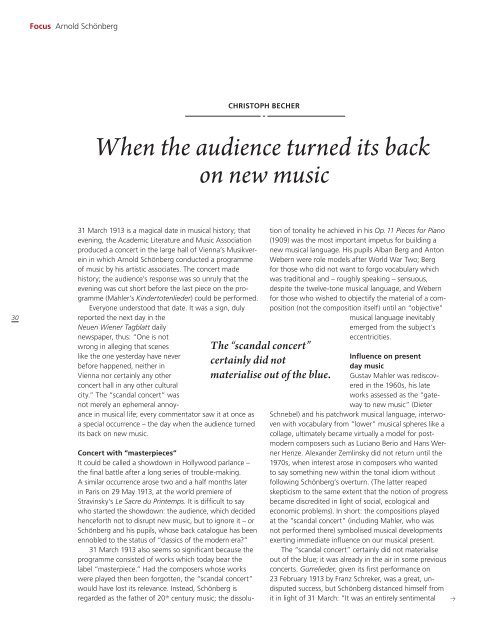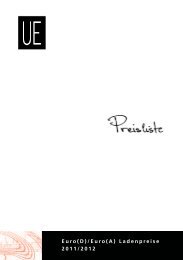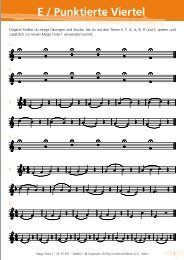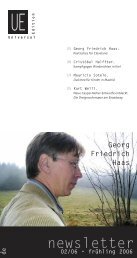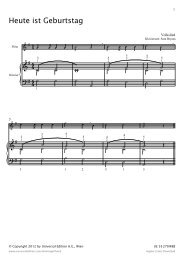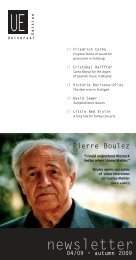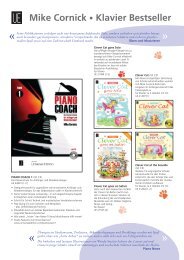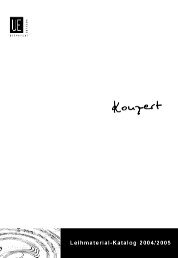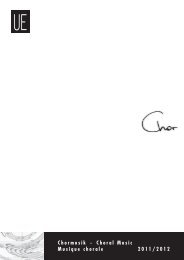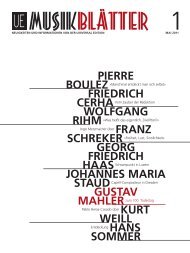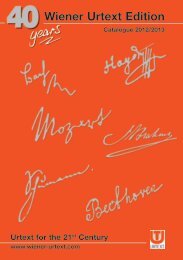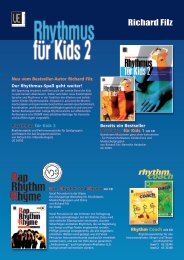Download a PDF file - Universal Edition
Download a PDF file - Universal Edition
Download a PDF file - Universal Edition
Create successful ePaper yourself
Turn your PDF publications into a flip-book with our unique Google optimized e-Paper software.
30<br />
focus Arnold Schönberg<br />
31 March 1913 is a magical date in musical history; that<br />
evening, the Academic Literature and Music Association<br />
produced a concert in the large hall of vienna’s Musikverein<br />
in which Arnold Schönberg conducted a programme<br />
of music by his artistic associates. The concert made<br />
history; the audience’s response was so unruly that the<br />
evening was cut short before the last piece on the programme<br />
(Mahler’s Kindertotenlieder) could be performed.<br />
Everyone understood that date. It was a sign, duly<br />
reported the next day in the<br />
Neuen Wiener Tagblatt daily<br />
newspaper, thus: “one is not<br />
wrong in alleging that scenes<br />
like the one yesterday have never<br />
before happened, neither in<br />
vienna nor certainly any other<br />
concert hall in any other cultural<br />
city.” The “scandal concert” was<br />
not merely an ephemeral annoyance<br />
in musical life; every commentator saw it at once as<br />
a special occurrence – the day when the audience turned<br />
its back on new music.<br />
concert with “masterpieces”<br />
It could be called a showdown in Hollywood parlance –<br />
the final battle after a long series of trouble-making.<br />
A similar occurrence arose two and a half months later<br />
in Paris on 29 May 1913, at the world premiere of<br />
Stravinsky’s Le Sacre du Printemps. It is difficult to say<br />
who started the showdown: the audience, which decided<br />
henceforth not to disrupt new music, but to ignore it – or<br />
Schönberg and his pupils, whose back catalogue has been<br />
ennobled to the status of “classics of the modern era?”<br />
31 March 1913 also seems so significant because the<br />
programme consisted of works which today bear the<br />
label “masterpiece.” Had the composers whose works<br />
were played then been forgotten, the “scandal concert”<br />
would have lost its relevance. Instead, Schönberg is<br />
regarded as the father of 20 th century music; the dissolu-<br />
christoph Becher<br />
When the audience turned its back<br />
on new music<br />
tion of tonality he achieved in his Op. 11 Pieces for Piano<br />
(1909) was the most important impetus for building a<br />
new musical language. His pupils Alban Berg and Anton<br />
Webern were role models after World War Two; Berg<br />
for those who did not want to forgo vocabulary which<br />
was traditional and – roughly speaking – sensuous,<br />
despite the twelve-tone musical language, and Webern<br />
for those who wished to objectify the material of a composition<br />
(not the composition itself) until an “objective”<br />
musical language inevitably<br />
emerged from the subject’s<br />
eccentricities.<br />
The “scandal concert”<br />
certainly did not<br />
materialise out of the blue.<br />
Influence on present<br />
day music<br />
gustav Mahler was rediscovered<br />
in the 1960s, his late<br />
works assessed as the “gateway<br />
to new music” (Dieter<br />
Schnebel) and his patchwork musical language, interwoven<br />
with vocabulary from “lower” musical spheres like a<br />
collage, ultimately became virtually a model for postmodern<br />
composers such as Luciano Berio and Hans Werner<br />
Henze. Alexander Zemlinsky did not return until the<br />
1970s, when interest arose in composers who wanted<br />
to say something new within the tonal idiom without<br />
following Schönberg’s overturn. (The latter reaped<br />
skepticism to the same extent that the notion of progress<br />
became discredited in light of social, ecological and<br />
economic problems). In short: the compositions played<br />
at the “scandal concert” (including Mahler, who was<br />
not performed there) symbolised musical developments<br />
exerting immediate influence on our musical present.<br />
The “scandal concert” certainly did not materialise<br />
out of the blue; it was already in the air in some previous<br />
concerts. Gurrelieder, given its first performance on<br />
23 February 1913 by Franz Schreker, was a great, undisputed<br />
success, but Schönberg distanced himself from<br />
it in light of 31 March: “It was an entirely sentimental


